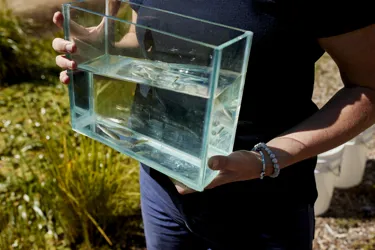Rainbow of hope for freshwater fish
- Friday 19th April 2024
- freshwater

The rainbowfish were released alongside 13 southern purple spotted gudgeon (Mogurnda adspersa), commonly referred to as Zombie fish, as part of an ongoing partnership with the North Central Catchment Management Authority (North Central CMA).
The delicate fry hatched on 28 September 2023, starting life smaller than the end of a pin. They were provided meticulous care by the SEA LIFE Melbourne team which included feeds three times a day, and ongoing water monitoring and maintenance ensuring optimal conditions for their development, ahead of release.
This latest achievement marks the third species bred and released into Victorian waterways. The partnership with North Central CMA has been instrumental in ensuring its success, offering essential support such as providing brood stock, identifying suitable release locations, and safeguarding Australia's threatened and endangered freshwater species.
North Central CMA Project Manager, Peter Rose, said, “As the name suggests, Murray Darling rainbowfish are usually found in the north of our catchment, but numbers have dwindled, and they are now listed as Threatened. Predator fish such as redfin and carp feed on their eggs and destroy their habitat. On top of that, climate change has had a significant impact on them. When aquatic vegetation is poor, they struggle to survive.
“That’s why the SEA LIFE Melbourne Aquarium breeding program is so important.” He continued, “Releasing them into wetlands such as this one at the Bendigo Botanic Gardens is a key step in their protection. It allows for further breeding and for them to develop the skills they need in the wild, without any predators. It’s a key step in re-introducing them into the wetlands and rivers they used to be prevalent in.”
SEA LIFE Melbourne Aquarium remains committed to breeding rainbowfish and continuing their efforts around other endangered species such as southern purple spotted gudgeon and olive perchlet. With continued support and collaboration, they aim to make a lasting impact on the conservation of Australia's precious aquatic ecosystems.
